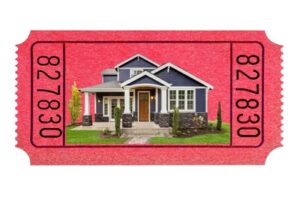 We’ve all had a go at a raffle at some point. You get yourself one or more tickets and everyone who has bought such has their ticket(s) thrown into a bag. One or more are drawn from the bag and those are the winners of the prize(s).
We’ve all had a go at a raffle at some point. You get yourself one or more tickets and everyone who has bought such has their ticket(s) thrown into a bag. One or more are drawn from the bag and those are the winners of the prize(s).
Raffles are frequently seen at fairs, charity events and alike, where you get to see the drum spinning and you stick your hand in to draw a ticket out of it. If that ticket is attached to a small prize, you win it. Of course, in this circumstance, you’re likely to win a jar of honey or a bottle of bubble bath. Those stalls are popular attractions at village fêtes or coffee mornings, for example.
However, it isn’t uncommon for there to be raffles where larger prizes are given away as a result. Car raffles, like those run by Best of the Best, are popular with gamblers, and you’ll usually find those being actively promoted in airports or shopping centres. But what about house raffles?
These have become increasingly popular in recent years but what are the rules around raffling off your house? Houses seem like an extravagant luxury to raffle off so simply. Is there a catch to these types of raffles? Why wouldn’t the owner simply sell the house and gain a tidy profit from it instead of raffling it off through a draw?
We are going to be take a closer look at house raffles to find out if they are actually legal and what happens with them. Plus, is it considered as a gambling activity, and if so, what sort of regulations and laws apply to such raffles?
What Is a Property Raffle?
 Essentially, this type of raffle operates in exactly the same way as any other. You ask people to pay a few pounds in order to enter and once all (or a minimum amount) of the raffle tickets for the prize have been purchased, one is drawn out. Whoever bought that ticket is the winner and new owner of the house in this situation. Therefore, the buyer will have paid a minimal amount for the ticket and, consequently, they win a house. A raffle also cuts out the need for an estate agent, and naturally, for the commission that they often take, too.
Essentially, this type of raffle operates in exactly the same way as any other. You ask people to pay a few pounds in order to enter and once all (or a minimum amount) of the raffle tickets for the prize have been purchased, one is drawn out. Whoever bought that ticket is the winner and new owner of the house in this situation. Therefore, the buyer will have paid a minimal amount for the ticket and, consequently, they win a house. A raffle also cuts out the need for an estate agent, and naturally, for the commission that they often take, too.
As it stands, about 80% of UK homeowners rank selling a home as the most stressful event that can occur in life. That beats out the organisation of a wedding or the start of a new career. And much of the stress from buying a new house or selling one is down to the fear of an estate agency.
If a house raffle can take out the stress of dealing with estate agents, then why not? Many people get tired of waiting for their house to sell and so simply decide to raffle it off as a way of moving on. Property winners may even evade having to pay stamp duty fees as well, thanks to HMRC stating that Capital Gains Tax is based on the open market value of the property. A raffled home can therefore be sold on by the winner shortly after securing it and wouldn’t have Capital Gains Tax to pay on it.
Is a Property Raffle Legal and Official in the UK?

Property raffles are not something that can be considered as a mainstream activity. Not many people really know about them or consider them when they sell a home but despite this being quite an outside the box route to take, raffling off a property is not specifically considered illegal in any way or against any rules.
In fact, such a raffle is not considered gambling in any way, so there is no need for the UK Gambling Commission to be involved in it or to give advice. Officially, the regulatory body states that,
“many people running raffles on high value items such as houses and cars do so by running free draws or prize competitions. These are not forms of gambling and we do not regulate them”.
As it happens, the Advertising Standards Authority (ASA) is responsible for providing advice on prize draws of this nature. Information provided by the ASA states:
“In traditional prize draws, the winner is chosen at random from all valid entries returned by participants.”
“Promoters of prizes draws should ensure that prizes are awarded in accordance with the laws of chance. If a verifiably random computer process is used, the ASA would expect to see evidence of this. If such a computer programme has not been used winners must be selected under the supervision of an independent observer (rule 8.24)”.
Therefore, as long as an independent judge is responsible for overseeing the drawing of a winning participant, then the ASA deems a house raffle to be legal and done properly.
One company going by the name of Raffle House operates raffles on various items, including dream houses, lifestyle rewards and fixed odds competitions. Its Dream Home raffle requires participants to buy a ticket for just £2, and this gives them a chance to win their own home, with Stamp Duty and legal fees paid as part of the reward. At the same time, Raffle House throws in the bills and utility costs for a whole year. Every month or two, a new house is raffled off via this company for a small ticket purchase price. Each entrant may also submit up to 5,000 paid entries into the raffle, meaning that they can pay £10,000 to gain the maximum number of raffle tickets.
In the terms and conditions of the Raffle House website, the following is stated with regards to the drawing of the winner:
“The Promoter shall take all reasonable steps to ensure and preserve the random nature of all Draws but shall not be required to comply with any particular regulatory or other standards in this respect. The Dream Home Competition Draw shall be managed and verified by a third-party who is independent of the Promoter. The Weekly Lifestyle Prize Draws shall be made using random number generating software and independently verified. The result(s) of any Draw are final.”
Through this, it is clear to see that it is operating under the necessary rules set out by the ASA with regard to house raffles. Only if a company or an individual was not drawing the winner via one of those methods would it be against the law.
What Happens When House Raffles Go Wrong?
 Let’s say that you decide that you want to enter into a house raffle. The property being raffled looks appealing to you and you’re in no doubt about wanting to be the winner of it. You purchase one or more tickets to enter the raffle and wait around for the draw date to arrive.
Let’s say that you decide that you want to enter into a house raffle. The property being raffled looks appealing to you and you’re in no doubt about wanting to be the winner of it. You purchase one or more tickets to enter the raffle and wait around for the draw date to arrive.
What are the downsides of entering such a competition, though? What if nobody or very few people purchase tickets for the draw? Or how about if things go awry with the people selling the house because they don’t want to let it go for a smaller sum of money than they believe it’s worth?
Let’s say that the property owners are raffling off a house that is worth £350,000, and tickets for that are being sold at £5 each. So that they can ensure they are securing that £350,000 value, they would need to sell at least 70,000 raffle tickets.
That’s not an easy task at all, especially if it’s an individual or a couple raffling the home off. Specific companies, like the aforementioned Raffle House, may be able to achieve closer to that amount. However, various stories have popped up of people who have chosen to raffle off their properties and haven’t reached anywhere near the value of it in ticket sales.
A Tale of Low Ticket Sales in Scotland
 Back in 2019, a Scottish castle with 17 bedrooms which was worth £2.5 million was raffled off by Susan DeVere. She wanted to try and get rid of the property located near Auchencairn, Kirkcudbrightshire following multiple failed attempts to sell it on. A raffle was the route she took. In order to enter the raffle, participants were required to simply buy a ticket for £5, and these were offered through Facebook and winacastle.co.uk. That raffle promised that the winner of the draw would “win the whole building freehold”. Instead, DeVere handed out £77,000 in cash prizes last June, thanks to low ticket sales.
Back in 2019, a Scottish castle with 17 bedrooms which was worth £2.5 million was raffled off by Susan DeVere. She wanted to try and get rid of the property located near Auchencairn, Kirkcudbrightshire following multiple failed attempts to sell it on. A raffle was the route she took. In order to enter the raffle, participants were required to simply buy a ticket for £5, and these were offered through Facebook and winacastle.co.uk. That raffle promised that the winner of the draw would “win the whole building freehold”. Instead, DeVere handed out £77,000 in cash prizes last June, thanks to low ticket sales.
One person who had entered into the draw and became enraged by the outcome complained to the ASA with regard to the payout, primarily due to it changing from an entire castle to a cash reward. The three cash prizes of £65,000, £7,000 and £5,000 only amounted to a small fraction of what the property was actually worth. DeVere was hoping to sell around 500,000 tickets from the raffle in order to cover the mortgage she had on the Scottish castle, but she informed the ASA that she didn’t reach that level. Therefore, she wasn’t able to give the property away. She claimed that she also made it clear to entrants that if enough tickets weren’t sold, then cash prizes would be given out instead.
DeVere also claimed that she offered the winner a chance to take a share of the castle and run a business there, but they chose the money prize instead. Yet, the ruling over this raffle and the cash prize was deemed “unfair” by the ASA because the cash reward was not an equivalent to the value of the castle.
“Because neither the advertised prize nor a reasonable alternative had been awarded, we concluded that the promotion had not been administered fairly and was in breach of the code”, said the ASA. DeVere concluded that she had done nothing wrong though and sought to challenge the ruling by the authority afterwards.
Millionaire Couple Keep Their Raffled Property and Pocket £500,000 in the Process
 Carina Alcock of Christchurch, Dorset entered into a property raffle herself in 2019. The competition was for a £3 million mega-house, and she was the drawn winner of the property. However, instead of managing to get her hands on the house, she was given a much more measly sum of £110,000 in cash. This is because the couple who had chosen to raffle the house, Mark and Sharon Beresford opted to keep their home and pocket £500,000 in the process!
Carina Alcock of Christchurch, Dorset entered into a property raffle herself in 2019. The competition was for a £3 million mega-house, and she was the drawn winner of the property. However, instead of managing to get her hands on the house, she was given a much more measly sum of £110,000 in cash. This is because the couple who had chosen to raffle the house, Mark and Sharon Beresford opted to keep their home and pocket £500,000 in the process!
The Beresfords said that they kept the £500k because their fee was “just about higher than the minimum wage”. That cash, they said, had been used for promotional costs, but it sparked fury from those people who had entered into the raffle.
Participants paid £25 to enter the property raffle, but the couple sold just under 30,000 tickets. That equated to about £750,000 in value from ticket sales, which was but a fraction of what the house was worth. This led to the Beresfords pulling the plug on the house prize as well as a £160,000 Aston Martin car offered as a prize for the runner up.
Win A Mega Home, which was responsible for hosting the raffle, did have rules in place that said the winner would receive a cash prize instead of the home if less than 120,000 tickets were sold. In the small print, a figure of 75% of the value of the tickets sold after promotion costs was noted for the winner in this instance.
Mr Beresford stated that he had spent a fortune on advertising and legal advice before entering into the raffle of his home and Aston Martin. This did little to placate ticket holders, though. Claims of the competition being misleading and a con were laid out by entrants through various outlets.
It Doesn’t Always Go Wrong
 Back in 2017, Dunstan Low managed to raise close to £1 million by raffling off his six-bedroom Lancashire manor house.
Back in 2017, Dunstan Low managed to raise close to £1 million by raffling off his six-bedroom Lancashire manor house.
That property was worth £845,000 at the time, and he walked away with the asking price from ticket sales. The remaining £153,000 was donated to charity once his legal costs were covered. Despite this, the punter who won the house, Marie Segar had no intention of living there herself. So, she ended up renting the property out for £1,500 a month instead.
Due to the story around the success of this raffle for Mr Low, countless other homeowners took the decision to engage in house raffles. Their hopes were high of beating the downturn in the housing market at the time.
Unfortunately, many entrants were restricted by confusing small print, which put pain to more raffles than a few. Ticket holders were left angered and enraged over prize draws that they deemed misleading.